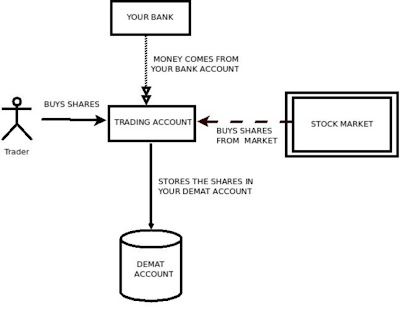I got an opportunity to do a guest post on two very good blogs some days back. One was on How to interpret Warren buffet rules and apply that to trading and another one was how to save for your Future Financial goals.
The response to the second article was more than expected and I had a very good learning experience with some of the readers on those blogs, I would like to share some of the comments with you so that you learn from them and share your ideas about it.
Read more Below.

I am putting some comments I got from the second article, They were very long, fruitful discussion on the separation between “Using a Financial Calculator” and “Influencing your Thoughts”. You can read the comments and actual discussion at the guest blog post itself which would be better for understanding.
Comment from Reader
Still I feel, some where the essence of reality is missing. Not getting convinced with the proportion of earnings and savings.
Eg:- (following the values to be entered in the fields in the tool)
Car – 2015 – 3L needs Rs. 4139 to be saved per month
holiday – 0 – 0 needs Rs. 0 to be saved per month
D’ Education – 2025 – 5L needs Rs. 1909 to be saved per month
Sons Marriage – 0 – 0 needs Rs. 0 to be saved per month
Retirement – 2040 – 10L needs Rs. 864 to be saved per monthClosely, the total amount to be saved per month comes to Rs. 7000.
For a guy earning 30K, to save Rupees 7K with all other expenditure, is not a small thing. To meet his requirements, should be a miser then – no movies (it costs around Rs. 1000 for a family – dad, mom & son to watch a movie ), no luxuries to wife (shopping) and children (say pocket money).
One thing I want to clearly tell you is my intention is not to find the tool as wrong calculator. My intention is to project the scope of the tool to be used by a common man. How a common man will really take the inputs based on the result from the tool and get influenced with.
Yes, it is the person’s personal problem – how to save and how not to; whether to go for saving or not. But it’s the tools responsibility to sustain the thought of saving in the users mind. It just should not be an analyzer or calculator.
It should be more than that. Of course, final decision is left to the user. But my view is, how is that, the tool is going to influence the users thoughts. That influence can lead to change the definition of savings for the user. See GFactor
When a person uses any tool, apart from the direct result, the impact of the tool on the usage also matters. Here, in this case, if the tool scares the user about the saving and if he stops planning for saving (lets just think this can happen for a while) then what is the scope of the usability of this tool.
Once again I am telling, I am not criticizing the tool and its functionality, I was just wondering about the kind of impact it can have on a common man. Coz, Common man never thinks about the logic behind the tool. He and his thoughts will be just carried away with the values. He definitely feels that the tool is misleading him.
Reply from Me
As I said … The tool is a just a giving you values based on the date you provide ..
I saw the numbers you have put in and to achieve these goals comfortably , 7k per month investment is required at any cost . Now if a person earns 30k , then no one can do anything .. Either he forgets some of the goals or earns more ..
There may be many 30k earners and many might be able to save 10k also , and some may not be able to save 1k also .. Now for them Its there personal problem of how to cut their expenses in such a way or optimize the expenses in such a way that their Future goals are also met .See an article on “Can you live with 90% of your Salary ? ”
Let me know your views on this .. this is an important aspect . Also let me know how is the tool responsible for . As I said earlier the biggest problem is not early investing .. if a person starts investing Earlier , then most of the problems which arise later can be minimized .
Personal Note :
The example you have given
Car – 2015 – 3L needs Rs. 4139 to be saved per month
holiday – 0 – 0 needs Rs. 0 to be saved per month
D’ Education – 2025 – 5L needs Rs. 1909 to be saved per month
Sons Marriage – 0 – 0 needs Rs. 0 to be saved per month
Retirement – 2040 – 10L needs Rs. 864 to be saved per month1. This example has all the Target dates same as what is was there by default .. I hope you are changing it to your personal Target dates ..
2. Why is Retirement Corpus 10L ? Is it really you think is your Retirement Corpus in 2040 ? By then your Monthly expenses would have increased to 7 times to today
.
I understood that its not your intention to find fault with calculator, you are trying to say that the tools must have more than what it has right now .. Which is a personal view I think ..
My personal views are different which you may not agree and that’s totally fine ..
I accept that the calculator could have been made more detailed and “influential” with more data in it , putting a “auto0-generated” Suggestions form .. That would be some “work” on my side. . which I will do some day .
However , coming to “Influencing” the thoughts , That is not a small task which will be very easy with a calculator . It takes lots of reading to develop it .. My readers who have been actively reading my articles or other sources are now fully influenced with the idea and now getting good feel of how to develop an attitude towards “;how to save and invest” .
you said “if the tool scares the user about the saving and if he stops planning for saving (lets just think this can happen for a while) then what is the scope of the usability of this tool.”
My views are different .
If a personal can not accept that he needs to save a certain amount based on the numbers he himself gave in the calculator , then he is not accepting the fact that there is some “problem”.
He has to accept this and find solutions for that rather than stop planning for saving altogether .. I agree than it can be disappointing for some one saving just 5k per month and seeing that he needs to invest (not only save) 15k if he wants to achieve his Financial goals (based on whatever info he gave in the calculator) .
He either has to increase his earnings or decrease his expenses or lower his expectations.
Now this reason why he is in this situation is because “most probably”, he is too late in his life planning for things.
At the end, all kind of tools have been made for people who know/can use it. I would like to mention that I assumed that everyone who is reading the article or taking a calculator has that minimal amount of understanding of Financial planning. I guess it was mistake to assume that. I should have mentioned that. Apologies for that.
I would love to hear your views on this. I am not sure if we are on the same ground when putting your ideas, maybe you are trying to say something and I am replying without understanding that thing and hence triggering another “I don’t agree with you” reply.
It may be a communication issue on my part, Let me know if that’s the case. Thanks for this wonderful conversation. at least I have learned too much. Thanks to you.
Manish
Special Thanks
Thanks to Barel Karsan and Mohan for letting me blog on their wonderful blogs, The biggest thanks to readers of Mohan who have made this conversation so enriching with their disagreements, Disagreements are the best things in the world, if its missing, there is no learning.
Note: Please no personal Attacks over comments by taking the name of anyone.










